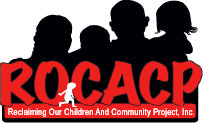ROCACP services children, youth and adults who are in active therapy with a licensed clinician and meets the eligibility requirements for rehabilitative, recovery and supportive services.
A referral must be made to our organization by a licensed clinician (LCSW-C, LCPC, Psychologist).

Adults Therapeutic Case Management
- Life Skills Training
- Family Strengthening Meeting
- Anger Management
- Assistance applying for entitlement (TCA, Food Stamp. SSI)
- Transportation Assistance
- Vocational/Competitive employment
- Mental Health Support Groups
- Parenting
- Community Integration
- Community Resource Linkages (housing, utility assistance)
Youth (Therapeutic Mentoring)
- Conflict resolution
- Anger management
- Social Skills Enhancement groups
- Monthly Peer support group
- Community Integration/Therapeutic activities
- Behavior Modification
- Educational Support
- Life Skills Training
Program Goals
Goals for each client will vary depending on their individual needs and goals set in their individual rehabilitation plan. However, the goal for every client will be to revert to original functioning ability prior to manifested crisis/mental illness which resulted in client not being able to function at work, home and social life.


Goals also include:
- Improved social skills
- Improved daily living skills
- Improved nutrition-food preparing.
- Improved hygiene-grooming skills
- Improved interpersonal skills-relationships self money management
- Self medication management
- Substance abuse prevention
- Illness Prevention
Referred PRP clients must:
- Meet medical necessity criteria
- Be referred by a therapist
- Be eligible for medical assistance
- Have a social/behavior impairment

